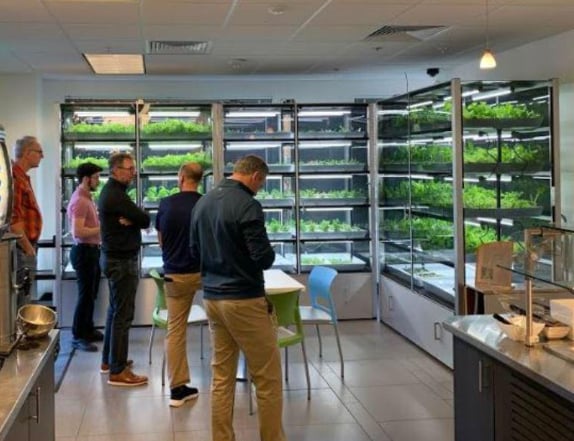November 27, 2025 | 22:07 GMT +7
November 27, 2025 | 22:07 GMT +7
Hotline: 0913.378.918
November 27, 2025 | 22:07 GMT +7
Hotline: 0913.378.918

A microfarm installation creates farm-to-salad-bar food.
Photo: BABYLON MICROFARMS
“Up to 60 percent of fresh produce is wasted before it reaches the consumer’s plate,” says Alexander Olsen, CEO and Co-founder of Babylon Micro-Farms, a small sustainable agriculture start-up located in Richmond, Va.
The problem of food waste was something that Olsen and his co-founder and Chief Technical Officer, Graham Smith, came across when they were students at University of Virginia. Olsen and Smith had set out to build hydroponics systems in refugee camps to help mitigate food shortage issues within the camps, but their idea was greeted with a much stronger interest from a broader market.
“We saw an opportunity to develop small on-site farming systems that could help businesses, communities, and consumers grow food on-site and eliminate the supply chain,” says Olsen, “What would the world look like if everyone had the ability to grow their own food?”
So in April of 2017 they incorporated and began testing models to serve a larger market.
“I think the thing that is special that we do is that it’s really soup to nuts, it’s totally integrated,” says Smith. “Whereas there are other companies in the vertical farming and hydroponic farming space that do one segment of the total technology chain or the service, we’re really a one stop shop. You don’t need to learn how to put together PVC piping to get a farm running. You don’t need to learn how to dose nutrients or pH or set up the lighting and irrigation schedule. You come to us for the hardware but we also have the software that underpins that technology. And we’re constantly collecting all the data so we know exactly how everything is going and we tweak the variables to make sure it’s always running smoothly.”
Their farming operation is controlled remotely through their proprietary software, that has an easy to navigate app where users can see the progress of their plants and know when to harvest them.
And because the company uses hydroponics to farm, meaning that they don’t use soil and the water is recycled through the system, their food grows with significantly less water than traditional farms.
“By dissolving the nutrients in water, it’s like an IV drip. The plant gets exactly what it needs at any one time, and the water recirculates, so it’s up to 90 percent less water than growing plants outdoors,” says Olsen.
“We’re building a bridge toward a more mainstream consumer market and allowing businesses and people who don’t want to be farmers and who don’t want all of that learning to have a turnkey experience,” says Olsen. “Our units today take around 30 minutes a week to operate and we’re remotely controlling all the complex scientific aspects of growing, and in doing so we make it really effortless. Our goal is to remove the green thumb from growing and we’ve achieved that.”
One of those units is in located in the cafeteria of the Commonwealth Senior Living facility in Gloucester, Va., where Chef Andre Smith uses the farm to bring fresh new plates to the residents of the house.
“The Babylon produce has really expanded our horizons, especially when we’re growing basil. Our Italian dishes pop now because we’re going into the Babylon farm and we’re picking basil and we’re putting it onto the dish,” Chef Smith says, “and we’re educating the residents at the same time.”
The farms currently yield about 8 pounds of leafy greens per week. And Olsen and Smith say that they aren’t trying to put traditional farms out of business, but rather tackle a niche of consumers who want to have access to a much higher quality and fresher product. “We are part of the solution but not the solution, and I think indoor agriculture broadly as an industry is something that fosters a lot of positive change,” says Olsen.
Babylon Micro-Farms has orders across 29 states and expects to have thousands of Micro-Farms installed within the next couple of years.
(The Hill)

(VAN) A new study reveals how the simultaneous effects of ocean acidification, salinity and loss of oxygen are making the world more fragile.

(VAN) Hopes are growing that the creation of the first 3D turkey gut model could be a turning point in the battle against the virulent blackhead disease.

(VAN) Tyson, America’s biggest meat supplier, plans to shutter one of its largest beef processing plants as the industry continues to struggle with low cattle supplies and political pressure from Washington.

(VAN) New FAO study shows how digital solutions are empowering farmers and fishers to prevent losses and build resilient agrifood systems.

(VAN) Brazil's COP30 presidency pushed through a compromise climate deal on Saturday that would boost finance for poor nations coping with global warming but that omitted any mention of the fossil fuels driving it.

(VAN) Poultry farmers in the UK have been warned that they could face one of the worst winters yet for bird flu.

(VAN) Prices of main-crop paddy have risen sharply, with jasmine rice hitting 16,100 baht per tonne — the highest level in years.